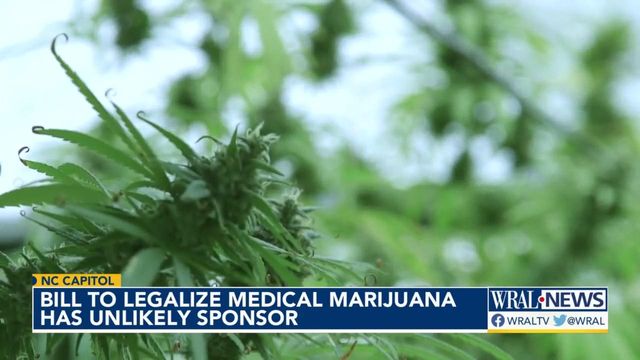Bill legalizing medical marijuana advances to NC Senate floor
A key legislative committee passed the measure on Wednesday. Voters overwhelmingly support marijuana legalization for medical purposes.
Posted — UpdatedThe Senate Rules Committee backed the measure with strong bipartisan support, unanimously advancing Senate Bill 711 to a full chamber vote.
State Sen. Bill Rabon, a Republican who represents a coastal district and chairs the rules committee, said the measure seeks to give those who need compassionate care an additional medical resource.
“It is nothing more than trying to help those people with the care that they need and augment their treatments as decided upon by the patient and by a physician,” he said.
The bill is expected to go to the floor of the state Senate for a vote on Thursday. It would then need final approval from the chamber on a different day before advancing to the state House, according to Lauren Horsch, a spokeswoman for Republican Senate leader Phil Berger. If it clears the House, it would go to Democratic Gov. Roy Cooper for final approval.
Jordan Monaghan, a spokesman for Cooper, reiterated previous sentiments of the governor’s support for legalization of medical marijuana.
“Studies have shown medical marijuana can offer many benefits to some who suffer from chronic conditions, particularly veterans, and the Governor is encouraged that North Carolina might join the 36 other states that have authorized it for use,” Monaghan said in a statement. “The governor will review this bill as it moves through the legislative process.”
Sen. Paul Lowe, a Forsyth County Democrat, said the bill could help residents with any of 15 qualifying medical conditions.
Qualifying medical conditions include cancer, epilepsy, Parkinson's disease, post-traumatic stress disorder and severe or persistent nausea. Eligible North Carolinians would need written authorization from a physician.
"There's no reason in the world why we shouldn't open things up so our citizens can take part in medicine that will help them,” Lowe said.
Sen. Don Davis, a Pitt County Democrat presently running for an open congressional seat, questioned whether the list of medical conditions was sufficient.
Rabon said earlier in the hearing that he believed the bill drafting process was comprehensive.
“It is my opinion that no state has done it as well as we are attempting to do it,” Rabon said.
If the bill becomes law, an 11-member commission would be allowed to issue 10 medical cannabis supplier licenses upon the recommendation of the state Department of Health and Human Services. An amendment the rules committee passed doubled the maximum number of cannabis centers each supplier could operate from four to eight.
Consumers would also be limited to a 30-day supply of marijuana.
Jere Royall, counsel for the North Carolina Family Policy Council, urged committee members to oppose the measure, arguing that it could lead to drug abuse and addiction.
“The harms and costs to individuals, families and the state greatly outweigh any potential benefits,” Royall said.
Rabon told reporters after the hearing that the latest movement has come on the heels of a five-year effort. Rabon survived Stage 3 cancer 20 years ago. Since then, he said he’s counseled many cancer patients and others about cannabis.
"We waited until after the primary to run it through,” Rabon told reporters.
Fifty-seven percent of those surveyed, including a plurality of Republicans and strong majorities of Democrats and unaffiliated voters, said they support legalizing marijuana for recreational purposes.
The poll conducted from April 6 to 10 reported a margin of error of 2.4 percentage points when respondents were asked about legalization for medical purposes and 2.7 percentage points when asked about legalization for recreational purposes.
Also expected to go to Cooper is a bill that would permanently legalize hemp.
The bill defines hemp as cannabis with less than 0.3% of Delta-9, the chemical in marijuana that produces the drug's high. The measure also exempts hemp from the state's list of controlled substances. If the Senate concurs with some tweaks the House made, it would go to Cooper’s desk for final approval.
Related Topics
• Credits
Copyright 2024 by Capitol Broadcasting Company. All rights reserved. This material may not be published, broadcast, rewritten or redistributed.






